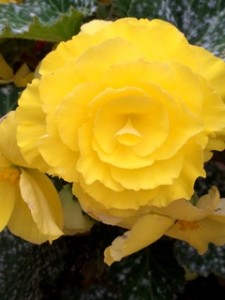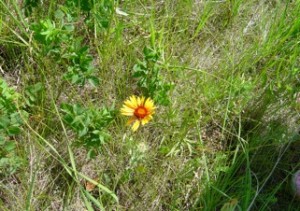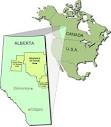My grandma’s favourite colour was yellow. (Being Canadian I spell both favourite and colour with “our”).
Her kitchen was yellow.
I loved her kitchen, despite not loving yellow.
She created good things in that kitchen.
The sun always seemed so bright in Grandma’s kitchen.
Perhaps it was the yellow walls. Perhaps it was the sunshine. Perhaps, and this is what I suspect, it was Grandma.
When my grandpa was dying, over 40 years ago, he dreamed that he painted the outside of their farmhouse yellow. He inferred that he defied conventional wisdom because Grandma liked yellow. It was the perfect metaphor for his devotion, devotion that would otherwise remain unspoken in their Germanic, one-must-not-show-emotion home.
She told me that story several times, always with a catch in her voice, so I knew the impact it had on her.
As a child I had yellow hair. Perhaps that’s why Grandma cherished me so lavishly. (Or not!) I still have yellow hair thanks to Brian, with his roll of tin foil and a purple paste down at the Phoenician Salon.
My grandma had yellow flecks in her eyes. Officially, she called her eyes green, but they were actually yellow. That trait popped up in one of my daughters and one of my granddaughters; they have yellow undertones in their irises. The effect is that their eyes look like they’re the same colour as their strawberry blond hair. It’s weird. Beautiful, exotic, but strange.
Mustard is yellow. It is my favourite condiment, in my opinion, a must-have for the complete enjoyment of a burger. Perhaps that’s where they got the name. I like the plain stuff. No Dijon, Honey or Horseradish; just plain mustard.
There are other good yellow foods. Nobody exposed me to squash as a child but my yellow-irised daughter shared the secret about the great flavour of butternut squash. I saute it in butter and maple syrup. Mmm!
I used to love Grandma’s pickled yellow beans. Yellow beans are very tasty, fresh from the garden too. Canned yellow beans are gross; they certainly don’t deserve the title “vegetables”.
There is nothing more heavenly than a homemade lemon pie. Grandma used to make them. A crust made of real lard, not hydrogenated vegetable oil, a sweet and sour sunshine filling, topped with a cloud of meringue, delicately kissed golden in the oven. Mmm again!
When I was young I thought it was weird to declare yellow as one’s favourite colour. I preferred purple (my dad’s chosen hue, also unconventional) and blue. Even pink, red, and certain shades of green but not yellow!
I don’t know that I ever saw Grandma wearing yellow. It’s not a flattering colour for many people. Some shades of it make ME look green.
Grandpa always said Grandma looked best in white (good thing she was a nurse) and blue, but that was HIS favourite colour, so he was biased there, don’t you think?
Why would someone select a colour that one cannot wear?
I know blue makes my eyes look bluer than they are (actually they’re a blue-grey-green, depending on the weather and what I’m wearing). I guess I got some of Grandma’s yellow iris DNA too.
Most of the clothing in which I feel most comfortable is blue, like jeans and faded denim shirts, and the fabulous turquoise dress I got for $13 at a dress shop in Phoenix.
See. I know the fun of wearing MY favourite colour!
I wore yellow to Grandma’s funeral. In fact my declaration that I intended to do so inspired other family members to dig out or borrow or buy yellow articles of clothing to wear.
One of the most touching things my husband ever did was show up at my sister’s before Grandma’s funeral, wearing a crisp new yellow dress shirt. He proved he actually listens!
He looked great in that shirt with his dark hair and brown eyes, and miraculously it was exactly the same shade as my yellow jacket. We looked like we had actually coordinated our wardrobe. Quite the feat! Do you have any idea how many shades of yellow there are?
My brother in law’s tie was the same yellow as my sister’s blouse, both of which were totally different from and clashed with our yellow.
In the weeks after Grandma’s funeral I would find myself weeping, often while walking our Golden Retriever, Divot, (our yellow dog), in our local dog park.
One day I felt like I was tapped on the shoulder.
There before me was a meadow of mostly yellow wildflowers, waving at me. My eye was drawn to the buffalo beans. Grandma taught me the name of buffalo beans. As a child, I picked them in the meadow immediately behind her farmhouse.
And there were some Brown-eyed Susans and others whose names I don’t yet know.
The flowers danced while the breeze whispered in my ear, something I didn’t quite catch. It felt like “I’m okay”. Or maybe, “I’m here”. Or, “I was here; now it’s your turn!”
At the very least, the message that comforted me was that whenever I see a yellow wildflower I can think of Grandma. And I do.
I think of the many things she taught me.
I remember of the warmth of her unconditional love.
Before her decline in the last few years, we would compare stories about the wonder of being a grandma. I remember laughing with her about the cute things my grandkids would say. And she would repeat the cute things I said when I was her little Grandtoy.
Come to think of it, that was one of the “yellow” moments of my life.
Thanks, again, Grandma!



